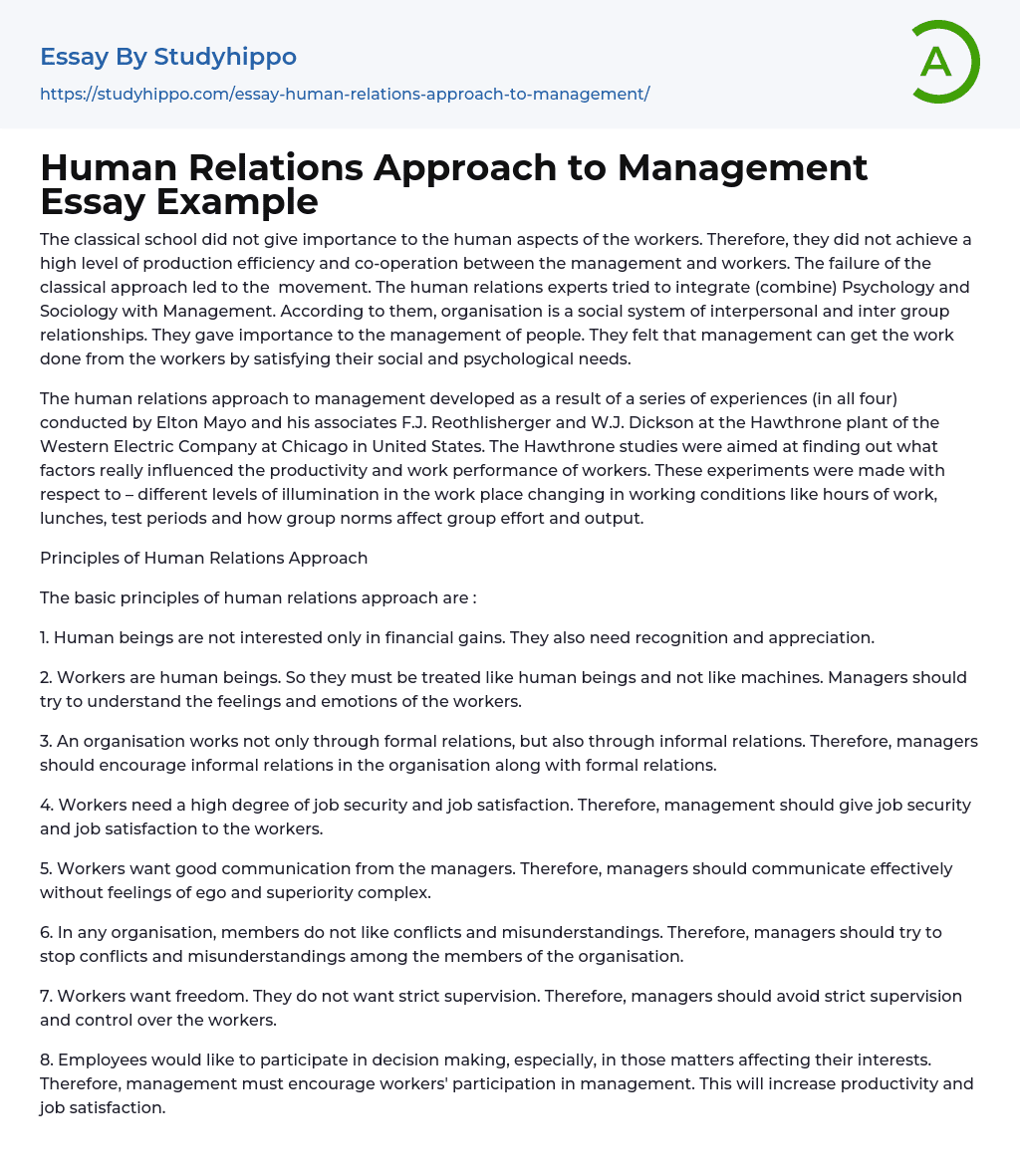The classical school did not give importance to the human aspects of the workers. Therefore, they did not achieve a high level of production efficiency and co-operation between the management and workers. The failure of the classical approach led to the movement. The human relations experts tried to integrate (combine) Psychology and Sociology with Management. According to them, organisation is a social system of interpersonal and inter group relationships. They gave importance to the management of people. They felt that management can get the work done from the workers by satisfying their social and psychological needs.
The human relations approach to management developed as a result of a series of experiences (in all four) conducted by Elton Mayo and his associates F.J. Reothlisherger and W.J. Dickson at the Hawthrone plant of the Western Electric Company at Chicago in United States. The Hawth
...rone studies were aimed at finding out what factors really influenced the productivity and work performance of workers. These experiments were made with respect to – different levels of illumination in the work place changing in working conditions like hours of work, lunches, test periods and how group norms affect group effort and output.
Principles of Human Relations Approach
The basic principles of human relations approach are :
1. Human beings are not interested only in financial gains. They also need recognition and appreciation.
2. Workers are human beings. So they must be treated like human beings and not like machines. Managers should try to understand the feelings and emotions of the workers.
3. An organisation works not only through formal relations, but also through informa
relations. Therefore, managers should encourage informal relations in the organisation along with formal relations.
4. Workers need a high degree of job security and job satisfaction. Therefore, management should give job security and job satisfaction to the workers.
5. Workers want good communication from the managers. Therefore, managers should communicate effectively without feelings of ego and superiority complex.
6. In any organisation, members do not like conflicts and misunderstandings. Therefore, managers should try to stop conflicts and misunderstandings among the members of the organisation.
7. Workers want freedom. They do not want strict supervision. Therefore, managers should avoid strict supervision and control over the workers.
8. Employees would like to participate in decision making, especially, in those matters affecting their interests. Therefore, management must encourage workers' participation in management. This will increase productivity and job satisfaction.
- Mediation essays
- Conflict Resolution essays
- Friendship essays
- Communication essays
- Dating essays
- Conversation essays
- Arranged Marriage essays
- Connection essays
- Conflict Management essays
- Greeting essays
- Orality essays
- Intercultural Communication essays
- Interpersonal Communication essays
- Cross-Cultural Communication essays
- Nonverbal Communication essays
- Effective Communication essays
- Communication Skills essays
- Ranch essays
- Leadership and Management essays
- Change Management essays
- Project Management essays
- Knowledge Management essays
- Operations Management essays
- Quality Management essays
- Risk Management essays
- Scientific Management essays
- supply chain management essays
- Performance Management essays
- Time Management essays
- Brand Management essays
- Total Quality Management essays
- Risk essays
- Manager essays
- Leadership essays
- Business Ethics essays
- Board Of Directors essays
- Product Management essays
- Comparative Analysis essays
- Decision Making essays
- Dispute Resolution essays
- Stress Management essays
- Business Management essays
- Brand Equity essays
- Branding essays
- Nike, Inc. essays
- Market share essays
- Razor essays
- Being A Leader essays
- Servant Leadership essays
- Leadership Experience essays




